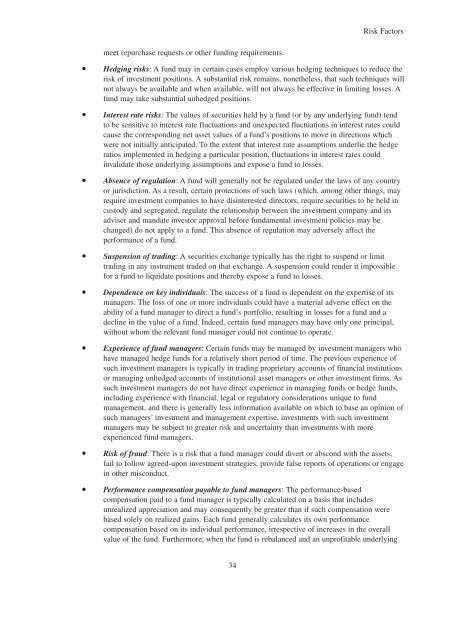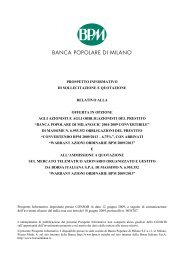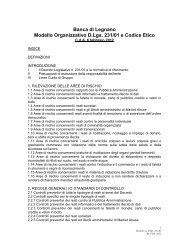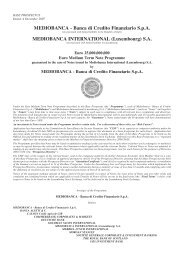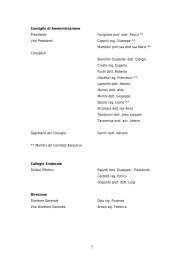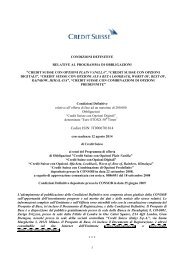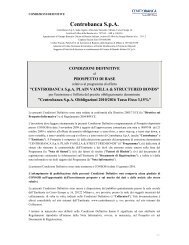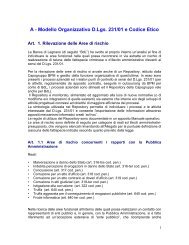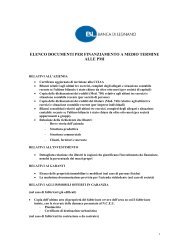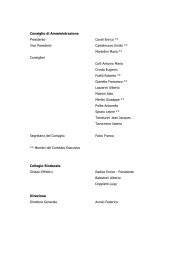- Page 1 and 2:
Execution Version Final Terms dated
- Page 3 and 4:
14. Put/Call Options: Not Applicabl
- Page 5 and 6:
(viii) (ix) Calculation Agent respo
- Page 7 and 8:
36. Additional provisions for Commo
- Page 9 and 10:
57. Additional selling restrictions
- Page 11 and 12:
PART B — OTHER INFORMATION 1. LIS
- Page 13 and 14:
Conditions to which the offer is su
- Page 15 and 16:
ANNEX 1 ITALIAN TAX REGIME The foll
- Page 17 and 18:
(1) Under the "tax declaration" reg
- Page 19 and 20:
Implementation in Italy of the EU S
- Page 21 and 22:
L’acquisto delle presenti Notes c
- Page 23 and 24:
(vii) Altri termini relativi al met
- Page 25 and 26:
il sistema TARGET2 o qualsiasi succ
- Page 27 and 28:
41. Forma delle Notes: Notes al Por
- Page 29 and 30:
56. Ulteriori restrizioni alla vend
- Page 31 and 32:
PARTE B — ALTRE INFORMAZIONI 1. Q
- Page 33 and 34:
Descrizione della procedura di ades
- Page 35 and 36: ALLEGATO 1 REGIME FISCALE ITALIANO
- Page 37 and 38: Gli investitori possono optare per
- Page 39 and 40: Direttiva. Il 13 Novembre 2008 la C
- Page 41 and 42: DICHIARA di essere a conoscenza che
- Page 43 and 44: L’Aderente dà atto di essere sta
- Page 45 and 46: Questioni Normative: Collocamento:
- Page 47 and 48: Taglio delle Notes: I tagli concord
- Page 49 and 50: Notes a Capitale Protetto: Notes a
- Page 51 and 52: In relazione alle Linked Notes dive
- Page 53 and 54: Level: 2 - From: 2 - Wednesday, Jul
- Page 55 and 56: Level: 2 - From: 2 - Wednesday, Jul
- Page 57 and 58: Level: 2 - From: 2 - Wednesday, Jul
- Page 59 and 60: Level: 2 - From: 2 - Wednesday, Jul
- Page 61 and 62: Level: 2 - From: 2 - Wednesday, Jul
- Page 63 and 64: Level: 2 - From: 2 - Wednesday, Jul
- Page 65 and 66: Level: 2 - From: 2 - Wednesday, Jul
- Page 67 and 68: Level: 2 - From: 2 - Wednesday, Jul
- Page 69 and 70: Level: 2 - From: 2 - Wednesday, Jul
- Page 71 and 72: Level: 2 - From: 2 - Wednesday, Jul
- Page 73 and 74: Level: 2 - From: 2 - Wednesday, Jul
- Page 75 and 76: Level: 2 - From: 2 - Wednesday, Jul
- Page 77 and 78: Level: 2 - From: 2 - Wednesday, Jul
- Page 79 and 80: Level: 2 - From: 2 - Wednesday, Jul
- Page 81 and 82: Level: 2 - From: 2 - Wednesday, Jul
- Page 83 and 84: Level: 2 - From: 2 - Wednesday, Jul
- Page 85: Level: 2 - From: 2 - Wednesday, Jul
- Page 89 and 90: Level: 2 - From: 2 - Wednesday, Jul
- Page 91 and 92: Level: 2 - From: 2 - Wednesday, Jul
- Page 93 and 94: Level: 2 - From: 2 - Wednesday, Jul
- Page 95 and 96: Level: 2 - From: 2 - Wednesday, Jul
- Page 97 and 98: Level: 2 - From: 2 - Wednesday, Jul
- Page 99 and 100: Level: 2 - From: 2 - Wednesday, Jul
- Page 101 and 102: Level: 2 - From: 2 - Wednesday, Jul
- Page 103 and 104: Level: 2 - From: 2 - Wednesday, Jul
- Page 105 and 106: Level: 2 - From: 2 - Wednesday, Jul
- Page 107 and 108: Level: 2 - From: 2 - Wednesday, Jul
- Page 109 and 110: Level: 2 - From: 2 - Wednesday, Jul
- Page 111 and 112: Level: 2 - From: 2 - Wednesday, Jul
- Page 113 and 114: Level: 2 - From: 2 - Wednesday, Jul
- Page 115 and 116: Level: 2 - From: 2 - Wednesday, Jul
- Page 117 and 118: Level: 2 - From: 2 - Wednesday, Jul
- Page 119 and 120: Level: 2 - From: 2 - Wednesday, Jul
- Page 121 and 122: Level: 2 - From: 2 - Wednesday, Jul
- Page 123 and 124: Level: 2 - From: 2 - Wednesday, Jul
- Page 125 and 126: Level: 2 - From: 2 - Wednesday, Jul
- Page 127 and 128: Level: 2 - From: 2 - Wednesday, Jul
- Page 129 and 130: Level: 2 - From: 2 - Wednesday, Jul
- Page 131 and 132: Level: 2 - From: 2 - Wednesday, Jul
- Page 133 and 134: Level: 2 - From: 2 - Wednesday, Jul
- Page 135 and 136: Level: 2 - From: 2 - Wednesday, Jul
- Page 137 and 138:
Level: 2 - From: 2 - Wednesday, Jul
- Page 139 and 140:
Level: 2 - From: 2 - Wednesday, Jul
- Page 141 and 142:
Level: 2 - From: 2 - Wednesday, Jul
- Page 143 and 144:
Level: 2 - From: 2 - Wednesday, Jul
- Page 145 and 146:
Level: 2 - From: 2 - Wednesday, Jul
- Page 147 and 148:
Level: 2 - From: 2 - Wednesday, Jul
- Page 149 and 150:
Level: 2 - From: 2 - Wednesday, Jul
- Page 151 and 152:
Level: 2 - From: 2 - Wednesday, Jul
- Page 153 and 154:
Level: 2 - From: 2 - Wednesday, Jul
- Page 155 and 156:
Level: 2 - From: 2 - Wednesday, Jul
- Page 157 and 158:
Level: 2 - From: 2 - Wednesday, Jul
- Page 159 and 160:
Level: 2 - From: 2 - Wednesday, Jul
- Page 161 and 162:
Level: 2 - From: 2 - Wednesday, Jul
- Page 163 and 164:
Level: 2 - From: 2 - Wednesday, Jul
- Page 165 and 166:
Level: 2 - From: 2 - Wednesday, Jul
- Page 167 and 168:
Level: 2 - From: 2 - Wednesday, Jul
- Page 169 and 170:
Level: 2 - From: 2 - Wednesday, Jul
- Page 171 and 172:
Level: 2 - From: 2 - Wednesday, Jul
- Page 173 and 174:
Level: 2 - From: 2 - Wednesday, Jul
- Page 175 and 176:
Level: 2 - From: 2 - Wednesday, Jul
- Page 177 and 178:
Level: 2 - From: 2 - Wednesday, Jul
- Page 179 and 180:
Level: 2 - From: 2 - Wednesday, Jul
- Page 181 and 182:
Level: 2 - From: 2 - Wednesday, Jul
- Page 183 and 184:
Level: 2 - From: 2 - Wednesday, Jul
- Page 185 and 186:
Level: 2 - From: 2 - Wednesday, Jul
- Page 187 and 188:
Level: 2 - From: 2 - Thursday, July
- Page 189 and 190:
Level: 2 - From: 2 - Wednesday, Jul
- Page 191 and 192:
Level: 2 - From: 2 - Wednesday, Jul
- Page 193 and 194:
Level: 2 - From: 2 - Wednesday, Jul
- Page 195 and 196:
Level: 2 - From: 2 - Wednesday, Jul
- Page 197 and 198:
Level: 2 - From: 2 - Wednesday, Jul
- Page 199 and 200:
Level: 2 - From: 2 - Wednesday, Jul
- Page 201 and 202:
Level: 2 - From: 2 - Wednesday, Jul
- Page 203 and 204:
Level: 2 - From: 2 - Wednesday, Jul
- Page 205 and 206:
Level: 2 - From: 2 - Wednesday, Jul
- Page 207 and 208:
Level: 2 - From: 2 - Wednesday, Jul
- Page 209 and 210:
Level: 2 - From: 2 - Wednesday, Jul
- Page 211 and 212:
Level: 2 - From: 2 - Wednesday, Jul
- Page 213 and 214:
Level: 2 - From: 2 - Wednesday, Jul
- Page 215 and 216:
Level: 2 - From: 2 - Wednesday, Jul
- Page 217 and 218:
Level: 2 - From: 2 - Wednesday, Jul
- Page 219 and 220:
Level: 2 - From: 2 - Wednesday, Jul
- Page 221 and 222:
Level: 2 - From: 2 - Wednesday, Jul
- Page 223 and 224:
Level: 2 - From: 2 - Wednesday, Jul
- Page 225 and 226:
Level: 2 - From: 2 - Wednesday, Jul
- Page 227 and 228:
Level: 2 - From: 2 - Wednesday, Jul
- Page 229 and 230:
Level: 2 - From: 2 - Wednesday, Jul
- Page 231 and 232:
Level: 2 - From: 2 - Wednesday, Jul
- Page 233 and 234:
Level: 2 - From: 2 - Wednesday, Jul
- Page 235 and 236:
Level: 2 - From: 2 - Wednesday, Jul
- Page 237 and 238:
Level: 2 - From: 2 - Wednesday, Jul
- Page 239 and 240:
Level: 2 - From: 2 - Wednesday, Jul
- Page 241 and 242:
Level: 2 - From: 2 - Wednesday, Jul
- Page 243 and 244:
Level: 2 - From: 2 - Wednesday, Jul
- Page 245 and 246:
Level: 2 - From: 2 - Wednesday, Jul
- Page 247 and 248:
Level: 2 - From: 2 - Wednesday, Jul
- Page 249 and 250:
Level: 2 - From: 2 - Wednesday, Jul
- Page 251 and 252:
Level: 2 - From: 2 - Wednesday, Jul
- Page 253 and 254:
Level: 2 - From: 2 - Wednesday, Jul
- Page 255 and 256:
Level: 2 - From: 2 - Wednesday, Jul
- Page 257 and 258:
Level: 2 - From: 2 - Wednesday, Jul
- Page 259 and 260:
Level: 2 - From: 2 - Wednesday, Jul
- Page 261 and 262:
Level: 2 - From: 2 - Wednesday, Jul
- Page 263 and 264:
Level: 2 - From: 2 - Wednesday, Jul
- Page 265 and 266:
Level: 2 - From: 2 - Wednesday, Jul
- Page 267 and 268:
Level: 2 - From: 2 - Wednesday, Jul
- Page 269 and 270:
Level: 2 - From: 2 - Wednesday, Jul
- Page 271 and 272:
Level: 2 - From: 2 - Wednesday, Jul
- Page 273 and 274:
Level: 2 - From: 2 - Wednesday, Jul
- Page 275 and 276:
Level: 2 - From: 2 - Wednesday, Jul
- Page 277 and 278:
Level: 2 - From: 2 - Wednesday, Jul
- Page 279 and 280:
Level: 2 - From: 2 - Wednesday, Jul
- Page 281 and 282:
Level: 2 - From: 2 - Wednesday, Jul
- Page 283 and 284:
Level: 2 - From: 2 - Wednesday, Jul
- Page 285 and 286:
Level: 2 - From: 2 - Wednesday, Jul
- Page 287 and 288:
Level: 2 - From: 2 - Wednesday, Jul
- Page 289 and 290:
Level: 2 - From: 2 - Wednesday, Jul
- Page 291 and 292:
Level: 2 - From: 2 - Wednesday, Jul
- Page 293 and 294:
Level: 2 - From: 2 - Wednesday, Jul
- Page 295 and 296:
Level: 2 - From: 2 - Wednesday, Jul
- Page 297 and 298:
Level: 2 - From: 2 - Wednesday, Jul
- Page 299 and 300:
Level: 2 - From: 2 - Wednesday, Jul
- Page 301 and 302:
Level: 2 - From: 2 - Wednesday, Jul
- Page 303 and 304:
Level: 2 - From: 2 - Wednesday, Jul
- Page 305 and 306:
Level: 2 - From: 2 - Thursday, July
- Page 307 and 308:
Level: 2 - From: 2 - Wednesday, Jul
- Page 309 and 310:
Level: 2 - From: 2 - Wednesday, Jul
- Page 311 and 312:
Level: 2 - From: 2 - Wednesday, Jul
- Page 313 and 314:
Level: 2 - From: 2 - Wednesday, Jul
- Page 315 and 316:
Level: 2 - From: 2 - Wednesday, Jul
- Page 317 and 318:
Level: 2 - From: 2 - Wednesday, Jul
- Page 319 and 320:
Level: 2 - From: 2 - Wednesday, Jul
- Page 321 and 322:
Level: 2 - From: 2 - Wednesday, Jul
- Page 323 and 324:
Level: 2 - From: 2 - Wednesday, Jul
- Page 325 and 326:
Level: 2 - From: 2 - Wednesday, Jul
- Page 327 and 328:
Level: 2 - From: 2 - Wednesday, Jul
- Page 329 and 330:
Level: 2 - From: 2 - Wednesday, Jul
- Page 331 and 332:
Unscheduled Holiday for such Curren
- Page 333 and 334:
FORM OF FINAL TERMS FOR NOTES LINKE
- Page 335 and 336:
8. Maturity Date: [Specify date] 9.
- Page 337 and 338:
paragraphs of this paragraph) (i) I
- Page 339 and 340:
ensure it is a page which shows a c
- Page 341 and 342:
(vii) Additional Business Center(s)
- Page 343 and 344:
paragraph) (i) Share(s)/Basket of S
- Page 345 and 346:
Scheduled Trading Days] (xxii) Barr
- Page 347 and 348:
(viii) (ix) Calculation Agent respo
- Page 349 and 350:
[Modified Following Business Day Co
- Page 351 and 352:
Exchanges]] [Underlying Index for e
- Page 353 and 354:
(i) (ii) (iii) Inflation Index/Bask
- Page 355 and 356:
Sponsor(s): [The [ ] Index is a Uni
- Page 357 and 358:
the Notes: (iii) Final Redemption A
- Page 359 and 360:
(xxii) Other terms or special condi
- Page 361 and 362:
Linked Conditions/ Specify] Cumulat
- Page 363 and 364:
(xviii) Other terms or special cond
- Page 365 and 366:
(i) (ii) Inflation Index/Basket of
- Page 367 and 368:
Payment Dates or Interest Period En
- Page 369 and 370:
ISSUE AND LISTING AND ADMISSION TO
- Page 371 and 372:
THE ISSUE/ OFFER] Notes has an inte
- Page 373 and 374:
ecognized as eligible collateral fo
- Page 375 and 376:
[Not applicable/provide other appli


